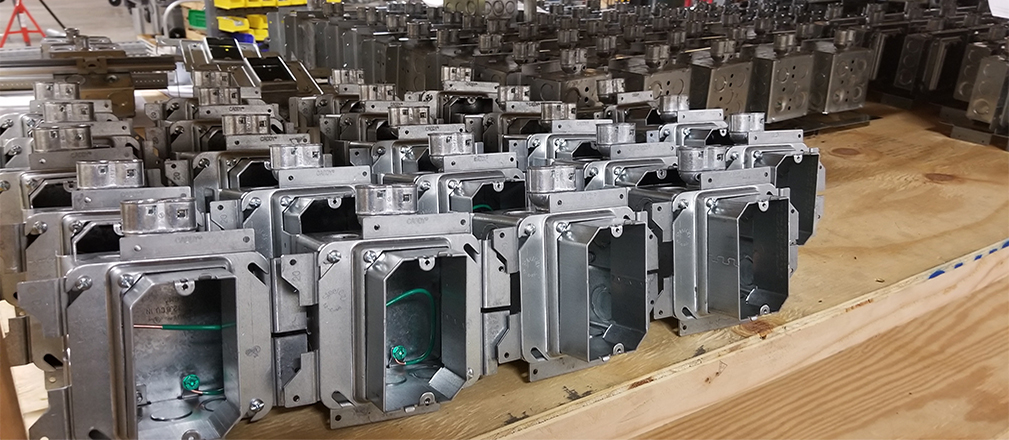The Key Components of a Successful Commercial Electrical Prefab
In an era where efficiency and innovation are driving forces in the construction industry, commercial electrical prefabrication has emerged as a transformative approach that promises to revolutionize how electrical systems are designed, fabricated, and installed in commercial buildings. This blog aims to explore the fundamental components that underpin a successful commercial electrical prefabrication program, shedding light on the essential building blocks that can significantly impact project outcomes. Whether you’re an electrical contractor, project manager, or industry enthusiast, understanding these key components is vital for harnessing the full potential of prefabrication in the commercial sector. But before we dive into the key components, let’s start out by understanding what prefabrication is.

What is Prefabrication?
Prefabrication in commercial electrical work is a construction method that involves the assembly of electrical components – including conduit bending, rough in boxes, wire spooling, panels, transformers, fixtures, and trim packages in a controlled environment – before they are transported to the construction site for installation. The benefits of prefabrication include reduced manpower required on the job site, improved quality control, safety & productivity, shortened install timelines, and reduced number of small parts & pieces to manage on-site. Plus, it can reduce trades overlapping in the same room. This approach differs from traditional on-site construction, where electrical components are typically assembled and installed at the project location.
9 Key Components to Electrical Prefabrication
Meticulous Planning:
Meticulous planning is the cornerstone of any successful prefabrication program. It involves a comprehensive evaluation of project requirements, client expectations, and the coordination of various teams and resources. During this phase, it’s essential to define project objectives, establish a clear timeline, and identify potential challenges that may arise during the prefabrication process. Effective planning ensures that the project is executed seamlessly, reducing costly delays and disruptions.
Design Expertise:
A well-executed design is crucial to the success of any prefabrication program. Collaborating with skilled electrical designers who are well-versed in commercial projects is essential (pst, we might know a few). The design phase should focus on creating detailed, accurate electrical layouts that optimize space, efficiency, and safety. With careful consideration of the project’s unique requirements, a thoughtful design can lay the groundwork for efficient prefabrication.
Assembly Line Productivity:
The planning and execution of an efficient assembly process forms the foundation for the success of any prefabrication endeavor. Standard processes, assembly lines, and training contribute to making the assembly of each item more efficient than what can be achieved in the field. Proper labeling and packaging, aligned with the designated areas, set up field personnel for success during the installation phase.
Quality Control:
Maintaining strict quality control throughout the prefabrication process is non-negotiable. This component involves a stringent quality assurance program that includes inspections, testing, and documentation at various stages of fabrication. By adhering to high-quality standards, you can minimize errors and defects, resulting in a more reliable and safe electrical system for the commercial building.
Skilled Workforce:
A skilled and knowledgeable workforce is indispensable for the successful execution of a prefabrication program. Electricians, technicians, and fabricators must be trained in the latest techniques and equipped with the necessary tools to handle prefabricated components effectively. At WB Moore, we invest in workforce development, ensuring that the project benefits from the expertise required for precise assembly and installation.
Efficient Logistics:
Streamlining logistics is another vital component of a successful prefabrication program. Effective transportation, storage, and coordination of prefabricated components are essential to avoid delays and ensure components are readily available when needed. A well-organized logistics strategy keeps the project on track and minimizes downtime, ultimately saving time and money.
Technology Integration:
The integration of technology is becoming increasingly important in prefabrication. Utilizing Building Information Modeling (BIM), 3D printing, and other innovative tools can enhance precision and collaboration throughout the design and fabrication processes. Embracing technology can lead to more accurate installations and improved project efficiency.
Collaboration and Communication:
Effective communication and collaboration among all project stakeholders, including the client, contractors, designers, and fabricators, are paramount. Clear and constant communication ensures that everyone is aligned with project goals and timelines, reducing misunderstandings and potential setbacks.
Sustainability and Safety:
The commitment to sustainability and safety should underpin every aspect of a prefabrication program. Utilizing environmentally friendly materials and practices not only benefits the environment but also demonstrates a commitment to responsible construction. Additionally, stringent safety measures protect workers and ensure compliance with industry regulations.
Prefabrication is a game-changer in the commercial electrical industry, enabling greater efficiency and innovation in modern construction projects. By embracing these key components, the commercial construction industry can harness the full potential of prefabrication, delivering cost-effective, efficient, and high-quality electrical installations that meet the demands of the modern era. Whether you’re an industry professional or a curious observer, understanding these elements is key to staying ahead in the ever-evolving landscape of commercial construction.
Looking to harness the benefits of prefabrication in your commercial electrical projects? Trust in WB Moore, your partner for cutting-edge prefabrication solutions. With our commitment to quality, efficiency, and innovation, we’re here to take your projects to the next level. Contact us today to discover how WB Moore can elevate your electrical installations through the power of prefabrication.
WB Moore stands as a leading electrical contractor serving the Carolinas, providing an extensive array of services, such as Electrical Construction, Electrical Services, Low-Voltage, Engineering, Pre-Construction Services, and Special Projects, assuring the fulfillment of diverse project requirements. Our foremost commitment is to safety, evident through our unwavering dedication to rigorous safety training initiatives. Opt for WB Moore to access unmatched proficiency and tailored solutions that surpass your expectations.



 916 N Poplar St, Charlotte, NC 28206
916 N Poplar St, Charlotte, NC 28206 (704) 331-9300
(704) 331-9300 info@wbmoore.com
info@wbmoore.com